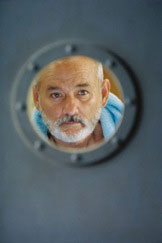The Darjeeling Limited, the story of three brothers and their quest to find "spiritual enlightenment" set against the exotic and unfamiliar setting of modern-day India, deals less with an actual father figure than with the carnage left behind by an absent one. Gradually, as the three struggle to understand both what they have lost and how to avoid visiting the same mistakes they have experienced upon their loved ones, the true meaning of fatherhood comes into sharper focus. (Interestingly, it is one of the rare violent moments in an Anderson film that serves to hasten their understanding, as an incidental character's response to his family's tragedy underscores what it is they have been seeking all along.)
But it is in The Royal Tenenbaums and The Life Aquatic with Steve Zissou that Anderson most directly addresses the role of fatherhood and the dangers of refusing to accept that role. Not coincidentally, these are also the only two films in Anderson's filmography named after specific individuals—in both cases, the father figure. But the similarities between the two stories run far deeper.
In Tenenbaums, an aging patriarch, Royal, battles to win back his family—a battle made necessary by his previous refusal to treat his children as anything other than amusing accessories. Royal must first recognize the many ways he has damaged his children through his failures as a father, and atone for them as best he can. And while he tries a number of easier (and funnier) approaches to the problem of his family, it is only once he begins to act like a true father—once he begins to love unconditionally—that the family can begin to heal. (As an aside, Fantastic Mr. Fox seems like a true oddity among Anderson's films, until one realizes that it can be best understood as "the Royal Tenenbaums for Children.")
 The Life Aquatic with Steve Zissou is, in many ways, the culmination of Anderson's artistic style and philosophical content. It is a film about a film, which is always a bit mind-bending; but more importantly, it is a film about one man's lifelong attempts to escape from fatherhood, and about his eventual acceptance of that very role. Zissou, a world-renowned oceanographer and documentary filmmaker, has lost his touch: His films are boring and scripted, and he grows increasingly unpleasant and unapproachable.
The Life Aquatic with Steve Zissou is, in many ways, the culmination of Anderson's artistic style and philosophical content. It is a film about a film, which is always a bit mind-bending; but more importantly, it is a film about one man's lifelong attempts to escape from fatherhood, and about his eventual acceptance of that very role. Zissou, a world-renowned oceanographer and documentary filmmaker, has lost his touch: His films are boring and scripted, and he grows increasingly unpleasant and unapproachable.
As he prepares to set out on an Ahab-like voyage of vengeance, he suddenly finds himself confronted by an unknown son. But rather than accept his new role as father, Zissou holds the young man at bay, including him in the filmmaking operations but refusing to acknowledge his own paternity. In one of the film's expository moments, a pregnant magazine reporter accompanying Team Zissou on their journey remarks that she "needs to find a baby for this father." Zissou understands her to have misspoken, but her "mistake" is absolutely correct when applied to Zissou himself. Many of the tribulations plaguing his declining years are brought into focus through the rejection of his paternal role; the solution to his struggles is directly before him, but his selfishness prevents him from seeing what is so clear to everyone else. Once again, it is an unusual moment of violence that precipitates Zissou's change of heart; and while Zissou's refusal to accept his role until it's too late is truly tragic, the fact that he accepts it at last cannot be overlooked.
The important thing about both Royal and Zissou is not just that they are broken but that they know it. Both realize that their selfishness and lack of interest in those they hold dear has cost them much, but both ultimately set out to mend their ways. For Royal, his reformation is rewarded by living out his old age in happiness. For Zissou, his change of heart comes too late to salvage his relationship with his son, but it clearly influences the way he will act henceforth: He is a man who has clearly learned his lesson and has resolved to amend his ways.
Royal and Zissou are both clearly altered by their experiences, and it is that very change—and their subsequent galvanization into action—that is so essential when trying to understand Anderson's world. Self-knowledge is not without merit, but acting on that knowledge is vital to his characters' redemption. Contrition is not simply a matter of identification; it is an embracing of the command to "go forth, and sin no more." That understanding of self and willingness to change is the ultimate message of Anderson's films.
The question of whether that message is sufficient to justify Anderson's mode remains a difficult one. No matter the answer, however, there is something encouraging in his repeated efforts to grapple with the need for redemption, particularly as it relates to modern paternity. Highlighting our society's troubling failures in the realm of fatherhood might be a worthwhile (if depressing) enterprise in itself; but recognizing not only that we have failed, but that we can, in fact, atone for our failures is not just worthwhile, it's fundamentally and profoundly hopeful.
Note: Anderson's films are populated by pervasive language, mature themes, and occasional sexual material—except for Fantastic Mr. Fox, which features nothing more objectionable than pervasive Roald Dahlism.





